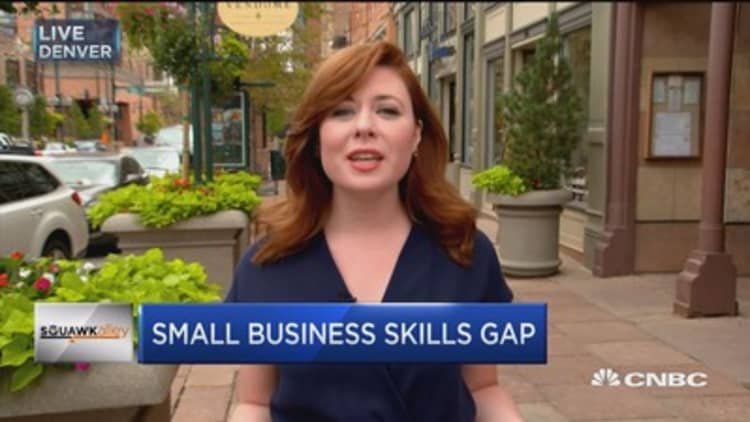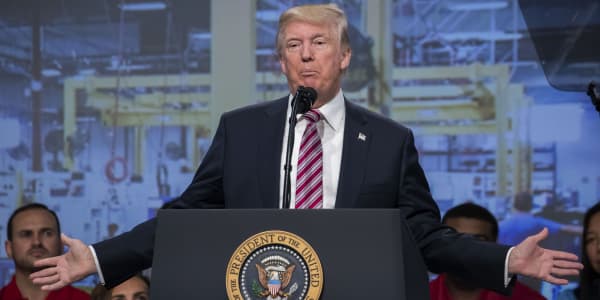
For Denise Burgess, the biggest challenge in running her construction-management firm isn't worrying about tax reform or what's ahead with the Affordable Care Act. It's simply finding the right people to do the job.
Burgess is president and CEO of Denver-based Burgess Services, a second-generation family-owned business that has been around for 42 years working on commercial projects. Typically, Burgess employs between 12 and 15 workers, but with subcontractors the company employs upward of 100 workers at one time, depending on the size of the project.
That's when things get complicated: With the recession having forced so many skilled laborers to leave the industry, finding the right people for the job has become a major challenge. According to the first-ever CNBC/SurveyMonkey Small Business Survey in June, jobs and the economy was the No. 1 issue for 33 percent of the 2030 businesses surveyed.
"They're younger, not as trained, not as seasoned," Burgess said. "Construction is also a career path that's not as glamorous as Silicon Valley software — it's not Facebook. It's something where you're going to work hard, but you'll also get paid really well. It's a hard sell, but not an impossible sell."
More from Small Business Cities:
Good news for The GOP: Small businesses are hungry for tax reform
Why this city is in the crosshairs in the battle to repeal and replace Obamacare
Across the country, finding skilled labor is becoming an increasingly large concern for small businesses like Burgess', and even more of a challenge in cities like Denver, where the labor market is tight, with unemployment at 2.3 percent. According to the National Federation of Independent Business in its monthly read on Main Street sentiment, finding skilled labor ranked a top-three issue in June, behind government regulations and taxes.
Small-business advocacy groups, like the nonpartisan National Small Business Association, also see skilled labor becoming a more frequent concern among its membership. A recent survey from the group found that 76 percent of small businesses are doing on-site training for specific positions — a positive economic signal that small companies are looking to hire and potentially expand.
"Worker shortages are moving up on our list of priorities," said Todd McCracken, president of the NSBA. "It's one of the top concerns among small companies now, as it was before the financial crisis. It's really good news that companies are beginning to hire, but it is a real struggle for them."
[Main Street firms] don't have the ability to do on-the-job training or run their own training programs in the same way large employers do. They have to take what's available in the marketplace, for the most part.Todd McCrackenpresident of the National Small Business Association
Main Street firms simply don't have the networks or ability to recruit in the same way large competitors do, McCracken said, adding that the NSBA hears the skills gap is most prevalent in fields like STEM (science, technology, engineering and math). "They also don't have the ability to do on-the-job training or run their own training programs in the same way large employers do," he said. "They have to take what's available in the marketplace, for the most part."
Hanging on to top talent
For Tony Song, owner of Evergreen Bicycle Outfitters in the Denver suburb of Evergreen, Colorado, it's less about hiring whose available in the marketplace and more about hanging on to the skilled labor he has. Song said his two head mechanics in the repair shop have a combined 50 years of experience, something he wouldn't easily be able to replace. In total he has seven workers, depending on whether the shop is in peak season.
"As it stands today with the labor market being what it is and how competitive it is, it would be very difficult for us to find somebody with that level of experience," Song said.
To keep workers happy, Song said they offer a health-care stipend, paid time off and flexibility, depending on the season, recognizing that liking your job means more than just making good money.
Burgess Services also negotiates family leave with employees, adding that the company has more flexibility with workers because it is a smaller business. They also offer health-care benefits and 401(k) plans, as well as paid vacation for full-time employees. But her large construction competitors are able to offer things like signing bonuses, which may be more attractive to prospective employees. "They're offering signing bonuses of up to $2,000, which a small business just can't compete with."
Add legalized marijuana into the mix in Colorado, and finding workers in Burgess' line of business, where safety is so paramount, can be even harder.
"We have people fail drug tests because marijuana is legal, but we have no tolerance when it comes to safety. We do random drug tests, and if they fail, they're off-site," Burgess said. "People who have been in the business a long time understand that, but for people coming in, it's a challenge for them."





